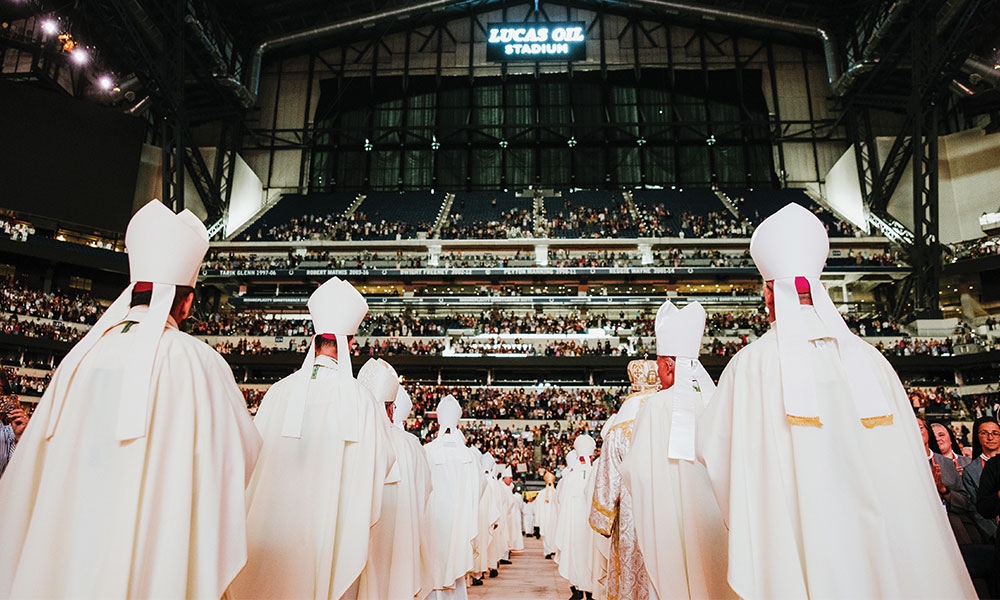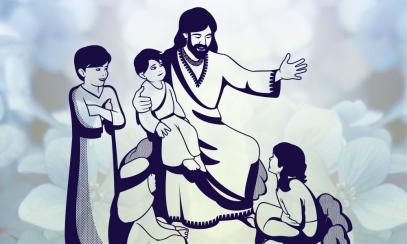
Via Fidelis and Revival: Proclaiming the Faith
Lee este artículo en español (Spanish language version)
As I mentioned last month, we are shifting topics to follow the Via Fidelis (‘the faithful way’ or ‘the way of the faithful’) that our shepherd, Bishop Jacques Fabre-Jeune, CS, has set in front of us.
Lee este artículo en español (Spanish language version)
As I mentioned last month, we are shifting topics to follow the Via Fidelis (‘the faithful way’ or ‘the way of the faithful’) that our shepherd, Bishop Jacques Fabre-Jeune, CS, has set in front of us.
This new path finds much confluence with what is still going on in the Eucharistic Revival movement in the United States and with what is happening in the global Church as well. So, let’s consider our Via Fidelis first year’s theme, Proclaim the Faith, in this context.
The National Eucharistic Congress in July was a defining moment for the Eucharistic Revival movement, and perhaps for the future of the Church in the United States. It will hopefully bear great fruit for years to come.
At the congress, over 50,000 people — including over 70 participants from our diocese — and countless more who joined virtually or watched video highlights, heard many things to strengthen faith and inform mission.
We heard Jonathan Roumie, a.k.a. “TV Jesus” from The Chosen, give a dramatic and inspiring reading of the Bread of Life discourse from John 6.
Father Mike Schmitz emphatically reminded us that revival always begins with repentance, a message that is pertinent for a national movement such as this and in every moment of renewal in our individual journeys of faith.
Gloria Purvis, the Diocese of Charleston’s own head of Ethnic Ministries, built upon this message by calling us to continued conversion to work to overcome divisions within our Church based on both race/ethnicity and ideology.
Bishop Robert Barron emphasized that alongside the rights and privileges of all the baptized, there is also a responsibility of witnessing to and spreading the faith.
This witness of faith was on full display throughout the event as we heard story after story of how Christ changed lives and how people have seen the lives of others change through the Eucharist. There was a fire, a zeal and an energy that was palpable in every room and talk at the congress.
This exuberance was not and is not intended to be something left to dissipate at the event or as the memory of the event becomes more distant. Rather, it is something to be harnessed to propel the Church forward. Cardinal Luis Antonio Tagle, papal envoy to the National Eucharistic Congress, pointed out in his homily at the closing Mass that the gift of Christ we have received in the Eucharist demands to be given further. It is not something to be stored but to be shared.
In other words, the faith we have received, the faith we treasure, demands to be proclaimed.
Throughout the congress, those attending in person and at home were consistently encouraged to Walk with One. The Walk with One evangelizing initiative, introduced by our bishops, challenges us each to identify one person to accompany on the journey of faith, one person to bring closer to Christ. When we think of proclaiming the faith, sometimes we think of a grandiose speech made in front of a large crowd or a maybe loud voice cutting through the din of a busy city street. This Walk with One vision shows us that proclaiming our faith is often something simpler yet much deeper. It is a more prolonged process, a relational one.
It is most likely true that we can all think of at least one person that we encounter on a regular basis to whom we can proclaim the Catholic Christian faith. This proclamation may take place all at once or gradually over a period of time. But either way, it begins with and is sustained by authentic witness in both word and life.
Over the next several months, we will unpack Proclaim the Faith in terms of the content of the faith that we proclaim and the act of proclamation itself. For now, I invite you to prayerfully consider who that one person or couple of individuals might be and begin to lift them to the Lord in prayer, asking for an outpouring of God’s revealing love.
Michael Martocchio, Ph.D., is the secretary of discipleship and the director of the Office of Catechesis and Christian Initiation. Email him at mmartocchio@charlestondiocese.org.



